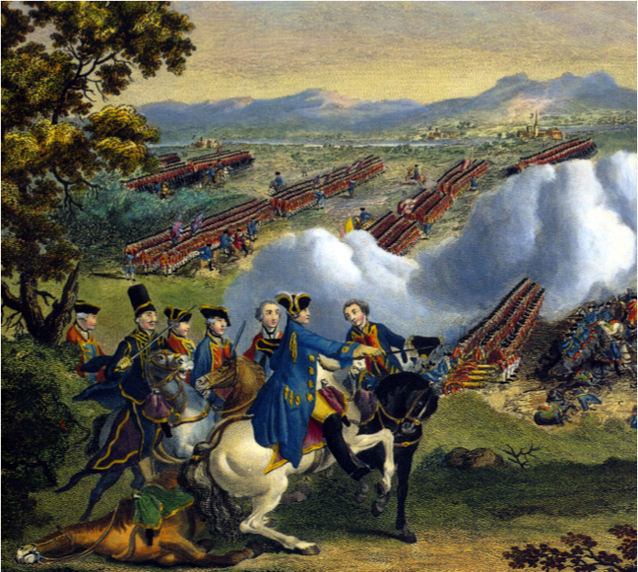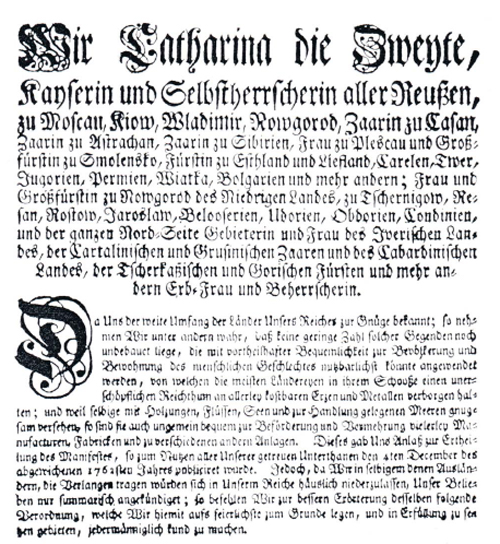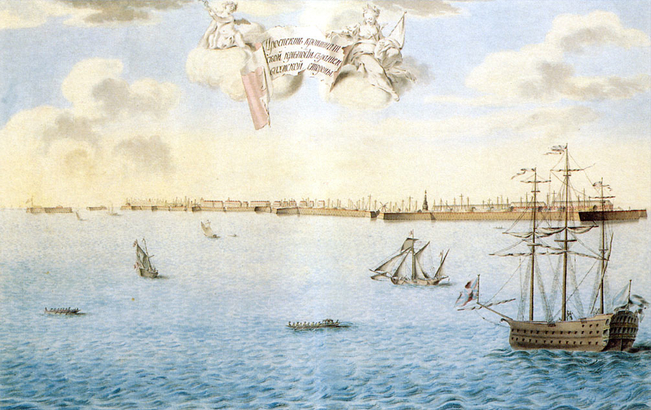History > Migration to Russia 1764-1767
Migration to Russia 1764-1767
In 1763, the Seven Year's War came to an end. This war was known as the French and Indian War in North America but was a global war. In the region of Hesse, where many Volga German families originated, homes, farms, and towns had been decimated during the fighting. This so-called "first world war" resulted in 900,000 to 1,400,000 deaths.
The ruling houses of the Holy Roman Empire of the German Nation were divided in this struggle, and their subjects were often forced to serve in the military and pay higher taxes to support the war. Many men were coerced into military conscription to serve as mercenaries fighting other nation's wars. In later years, some of the Hessian soldiers were brought to North America to fight for the British in the Revolutionary War.
The ruling houses of the Holy Roman Empire of the German Nation were divided in this struggle, and their subjects were often forced to serve in the military and pay higher taxes to support the war. Many men were coerced into military conscription to serve as mercenaries fighting other nation's wars. In later years, some of the Hessian soldiers were brought to North America to fight for the British in the Revolutionary War.
After the Seven Year's War ended, the population in central Europe slowly recovered. Farmland and food were soon in short supply. Many families without land lived on the edge and had little prospect of a stable life. This fact and poor harvests in the early 1760s drove up food prices, and shortages became prevalent.
The Seven Year’s War was fought on religious grounds, and the winners determined what faith their subjects would follow. Of course, this did not always match the spiritual practice that the people preferred.
It was a difficult time for many people living in Central Europe during the 1760s, especially the landless lower classes. As is natural, many people wanted to find a better life, even if that meant leaving their homeland. According to Ben Franklin, there were around 100,000 Germans living in Pennsylvania by 1766.
At this same time, Russia was expanding its empire to the south after winning territory from the Ottoman Empire. Catherine II (Catherine the Great) and her government wanted to solidify this region as Russian territory. She needed settlers who could turn the land into productive farms and stabilize this region of the empire.
Catherine was born in Stettin, Pomerania, Prussia, as Sophie Friederike Auguste von Anhalt-Zerbst-Dornburg. Catherine was raised in an environment of German culture and traditions. She became Empress of Russia in July 1762 following a coup d'état and the assassination of her husband, Peter III, at the end of the Seven Year's War.
Catherine's Manifesto, issued in 1763, encouraging settlement in Russia could not have come at a better time for many landless people who had been devastated through years of war. The Manifesto offered paid travel costs, free land, tax exemption, freedom of religion and language, self-government, and exemption from military service in perpetuity. This was an unprecedented offer to entice immigration.
The Seven Year’s War was fought on religious grounds, and the winners determined what faith their subjects would follow. Of course, this did not always match the spiritual practice that the people preferred.
It was a difficult time for many people living in Central Europe during the 1760s, especially the landless lower classes. As is natural, many people wanted to find a better life, even if that meant leaving their homeland. According to Ben Franklin, there were around 100,000 Germans living in Pennsylvania by 1766.
At this same time, Russia was expanding its empire to the south after winning territory from the Ottoman Empire. Catherine II (Catherine the Great) and her government wanted to solidify this region as Russian territory. She needed settlers who could turn the land into productive farms and stabilize this region of the empire.
Catherine was born in Stettin, Pomerania, Prussia, as Sophie Friederike Auguste von Anhalt-Zerbst-Dornburg. Catherine was raised in an environment of German culture and traditions. She became Empress of Russia in July 1762 following a coup d'état and the assassination of her husband, Peter III, at the end of the Seven Year's War.
Catherine's Manifesto, issued in 1763, encouraging settlement in Russia could not have come at a better time for many landless people who had been devastated through years of war. The Manifesto offered paid travel costs, free land, tax exemption, freedom of religion and language, self-government, and exemption from military service in perpetuity. This was an unprecedented offer to entice immigration.
Russian recruiters carried the Manifesto throughout the German-speaking parts of Europe, luring thousands with promises of a better life in a faraway land. Over 30,000 people would choose to become colonists and start a new life on the Russian frontier. They settled in 104 colonies along the lower Volga River near the frontier town of Saratov. Over time, these colonists would evolve into a distinct ethnic group known as the Wolgadeutschen or Volga Germans.
Sources
Koch, Fred C. The Volga Germans: In Russia and the Americas, from 1763 to the Present. University Park: Pennsylvania State UP, 1977. 192-94. Print.
Scheuerman, Richard D., and Clifford E. Trafzer. The Volga Germans: Pioneers of the Northwest. Moscow, ID: U of Idaho, 1980. Print.
Scheuerman, Richard D., and Clifford E. Trafzer. The Volga Germans: Pioneers of the Northwest. Moscow, ID: U of Idaho, 1980. Print.
Last updated October 21, 2023


